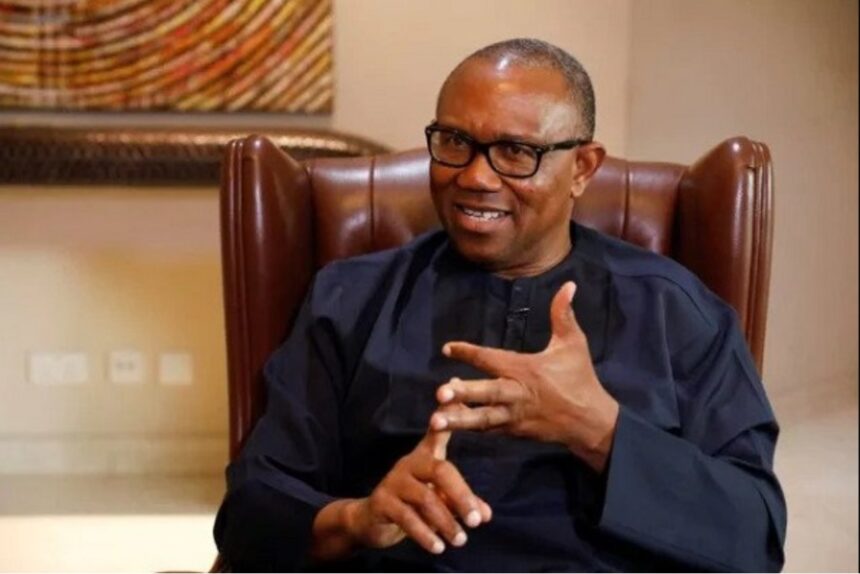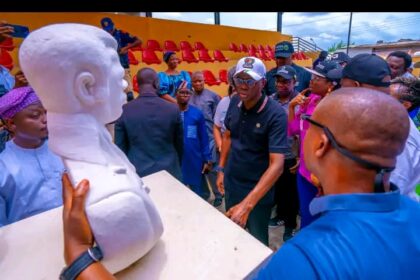By Dr. Abayomi Arabambi (FBAU)
The ancient Greek historian Thucydides once wrote that a society that chooses comfort over truth gets neither. This timeless warning finds disturbing relevance in Nigeria today, where Peter Obi, the self-styled “Mr. Clean” of Nigerian politics, has perfected the art of speaking loudly about national problems while remaining conspicuously silent about the most violent threat emanating from his own backyard.
Obi’s studied avoidance of condemning IPOB’s reign of terror in the South-East isn’t just political pragmatism—it’s a moral failure that exposes the hollowness of his leadership claims. To fully grasp the gravity of Obi’s hypocrisy, we must examine Nigeria’s long history of leaders failing to confront ethnic militancy within their own communities. In the First Republic, Obafemi Awolowo famously condemned the violence in Yoruba lands while maintaining his own nationalist credentials.
During the Niger Delta militancy crisis, Goodluck Jonathan, despite being from the region, didn’t hesitate to label the militants as criminals. Even Nnamdi Azikiwe, the great Zik of Africa, while advocating for Igbo interests, never equivocated in condemning violence. This is what true leadership looks like.
Yet Peter Obi, who positions himself as Nigeria’s messianic figure, breaks from this tradition in dangerous ways. Consider the chilling statistics: According to the Council on Foreign Relations’ Nigeria Security Tracker, IPOB and its armed wing, the Eastern Security Network (ESN), were responsible for at least 175 violent incidents and over 500 deaths in the South-East between 2021-2023.
The International Crisis Group reports that these groups have destroyed more than 100 police stations and other government facilities. The Nigerian government estimates that IPOB’s frequent sit-at-home orders have cost the South-East economy over N4 trillion in lost productivity. These aren’t abstract numbers—they represent real lives destroyed, families shattered, and communities traumatized.
What makes Obi’s silence particularly egregious is his selective outrage. When bandits attacked a train in Kaduna in March 2022, Obi was among the first to issue a strong condemnation. Following the Abuja-Kaduna highway kidnappings, he gave media interviews demanding better security.
Yet when IPOB militants beheaded a lawmaker in Anambra or set a pregnant woman ablaze in Imo for violating their sit-at-home order, Obi’s usual eloquence evaporated. This pattern reveals a troubling calculus: outrage against Northern violence boosts his national profile, while condemning IPOB risks alienating his base.
Historical precedents warn us where such hypocrisy leads. In 1966, Nigeria’s political class failed to decisively condemn ethnic violence until it escalated into civil war. In Rwanda, moderate Hutu politicians’ unwillingness to firmly denounce growing extremism within their community contributed to the 1994 genocide.
Even in Nigeria’s recent history, we’ve seen how the government’s initial soft approach to Boko Haram allowed the group to metastasize into the monster it became. Leadership requires naming threats clearly and early—something Obi consistently refuses to do regarding IPOB.
The economic consequences of Obi’s silence are equally devastating. The South-East, once Nigeria’s commercial heartbeat, is becoming an economic wasteland. The Manufacturers Association of Nigeria reports that over 35% of businesses in the region have either scaled down operations or relocated due to insecurity.
The Onitsha Main Market, once West Africa’s largest, now operates at less than 60% capacity because of IPOB’s frequent shutdowns. International investors are fleeing, a 2023 Financial Times report noted that foreign direct investment in the South-East dropped by 72% between 2020-2023. Yet Obi, an economist by training, remains mute as his people’s economic future burns.
Perhaps most damning is Obi’s betrayal of Nigeria’s security personnel. Data from the Armed Forces Memorial Trust shows that over 250 security agents (police, army, DSS) have been killed in the South-East since 2021, many in gruesome circumstances, beheadings, burnings, ambushes.
These men and women swore to protect Nigeria, yet their commander-in-chief aspirant won’t even acknowledge their killers by name. Contrast this with how American politicians universally condemn attacks on their police, or how British leaders across parties denounce IRA violence. True statesmen don’t play politics with the lives of those who protect the nation.
Obi’s defenders offer weak justifications. Some claim speaking against IPOB would make him a target. But when has leadership ever been about safety? Others argue he quietly works behind the scenes.
Yet leadership requires visible moral clarity, especially when civilians are being slaughtered. The most laughable defense is that Obi condemns “all violence” generally. This is like a doctor treating cancer and malaria with the same drug—ineffective and dangerous. Specific problems require specific solutions, starting with specific condemnations.
The psychological impact on South-East residents is profound. Interviews conducted by myself with traders in Onitsha, students in Nsukka, and professionals in Aba after the 2023 Presidential Election reveal a population living in terror, abandoned by their supposed leaders.
“We’re hostages twice over,” said a university lecturer who requested anonymity for fear of IPOB reprisals. “The gunmen control us by day, and our politicians betray us by night.” This is the tragic reality Obi’s silence enables.
What makes this particularly galling is Obi’s constant preaching about “a new Nigeria.” But nations aren’t built on selective outrage or ethnic pandering.
America didn’t become great by Southern politicians tolerating the KKK. Britain didn’t develop by London politicians ignoring IRA bombs. Nigeria won’t progress if its would-be leaders can’t even condemn violence in their own communities.
The historical parallels are ominous. In 1999, when Obasanjo became president, he didn’t hesitate to crush the Oodua People’s Congress (OPC) excesses in his own Southwest. In 2009, Yar’Adua (a Northerner) ordered the brutal suppression of Boko Haram in its infancy.
Even former President Buhari, often accused of Northern bias, didn’t tolerate the murderous excesses of herdsmen from his own ethnic group. Leadership demands this uncomfortable courage, the willingness to clean one’s own house first.
As the 2027 elections approach, Nigerians must ask: Can we trust a man who negotiates with truth based on geography? Who condemns violence when it scores political points but stays silent when it requires moral courage?
The South-East’s blood-soaked soil deserves answers. Nigeria’s security personnel deserve answers. History will remember Peter Obi’s choice, will it be as a leader who stood firm, or just another politician who stood aside?
The ancient Greeks had a concept called “parrhesia”, fearless speech. It was considered the highest virtue in a leader, the willingness to speak painful truths regardless of consequence. Nigeria desperately needs this virtue today.
Until Peter Obi finds his voice on IPOB’s carnage, his much-touted credentials will remain what they’ve always been, a beautifully wrapped package with nothing of substance inside. The South-East bleeds, Nigeria watches, and Peter Obi’s silence grows louder by the day.
- Dr Arabambi, factional Publicity Secretary of the Labour Party, wrote from Abeokuta, Ogun State











